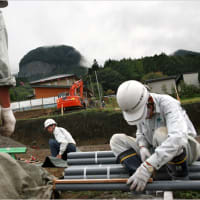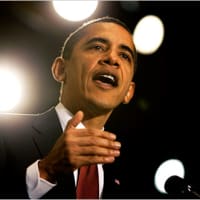
Brown ready to take on challengers
ByJames Blitz, Political Editor
Published: May 10 2007 21:57 | Last updated: May 10 2007 21:57
Gordon Brown, Britain’s chancellor of the exchequer, will on Friday launch his campaign to succeed Tony Blair, stating that he is prepared publicly to debate with any potential leadership contenders over the next few days.
The start of Mr Brown’s campaign follows Tony Blair’s announcement on Thursday that he will step down as prime minister on June 27, five days after he has attended his last European Union summit.
ADVERTISEMENT
Mr Blair’s long-awaited resignation plans, delivered to party activists in his Sedgefield constituency in north-east England, bring down the curtain on the longest-serving Labour prime minister, and the most dominant British political figure since Margaret Thatcher.
“Sometimes the only way you conquer the pull of power is to set it down,” he said.
Video
non-subscription columnist and thumbnail
Philip Stephens on Tony Blair’s decision to resign as prime minister after 10 years in power
Mr Brown, who finally takes centre stage after a decade in Mr Blair’s shadow, will invite two left wing rivals – Michael Meacher and John McDonnell – to debate with him at a London venue on Sunday. It appears increasingly unlikely that either will get the public support of 44 Labour MPs necessary to qualify for the main stage of the contest.
But Mr Brown, who is seen by critics as domineering and has even been accused of displaying “Stalinist ruthlessness”, is determined to underline the impression that he has always sought a contest – and that it is not his fault if rivals fail to materialise.
“Gordon is going out of his way to engage with anyone who wants to,” said a senior ally last night. “He is engaging and he is listening. That is the tenor of what we want to do over the next few weeks.” Mr Brown’s London campaign will kick off what senior allies call an intense five days of activity by the chancellor.
Mr Brown is almost certain to win the leadership and enter Number 10 on June 27. It may even be that he wins the leadership without facing any rival at all.
On Thursday, Mr Blair, whose popularity has been dented by his decision to go to war in Iraq along the US, asked the nation to forgive his failings.
“I give my thanks to you, the British people, for the times I have succeeded. And my apologies to you for the times I have fallen short.” Mr Blair acknowledged, too, that his 1997 victory had raised too much optimism about what could be achieved over subsequent years.
“Expectations were so high,” Mr Blair said. “Too high. Too high in a way for either of us.” The outgoing prime minister said Britain had changed for the better over the last decade – but he came as close as he has ever done to acknowledging that the Iraq invasion was a mistake.
“I ask you to accept one thing,” Mr Blair told 250 party activists in a long-awaited announcement. “Hand on heart, I did what I thought was right. I may have been wrong. That’s your call. But believe one thing if nothing else: I did what I thought was right for our country.”
Labour will now conduct a six week “contest” which will culminate in a special conference on Sunday June 24 where Mr Brown’s victory is expected to be declared.
The following day, Mr Blair will report to the Commons on the outcome of the European summit. On Wednesday June 27, he will answer his last questions as prime minister in the House of Commons before tendering his resignation to the Queen.
Mr Blair’s departure will remove the most dominant figure in British politics for 13 years and the second longest-serving prime minister in the European Union.
He transformed the British political landscape, dragging the Labour party which he has led since 1994, to the electoral centre-ground and winning a record three consecutive general election victories.
But the high hopes and optimism that accompanied his 1997 triumph against the incumbent Conservative party have dwindled following his support for the US-led invasion of Iraq. A whiff of financial scandal over allegations of illegal party funding and the wear and tear of government have also taken their toll, causing Mr Blair’s popularity ratings to plummet even further.
While critics singled out the war in Iraq and disappointing public sector reforms, Mr Blair’s resignation announcement drew tributes from fellow leaders around the globe. Jose Manuel Barroso, president of the European Commission, said he had taken Britain into the mainstream of the European Union and left an “impressive legacy”, including his commitment to take “action against climate change and for fighting poverty in Africa”.
Shinzo Abe, Japan’s prime minister, said Mr Blair had done a ”magnificent job” over ten years, particularly in relation to education reform and the economy. Jan Peter Balkenende, Dutch premier, said his UK counterpart had ”made a lot of good things happen in the economy and society”. Bertie Ahern, the Irish prime minister, said Mr Blair deserved an ”honoured place in our history” for devoting ”unprecedented time and attention” to bringing about peace in Northern Ireland.
Mr Brown is not expected to call an election immediately after becoming prime minister. This is because Britain’s constitutional arrangements allow for a governing party to change its leader – and therefore the sitting prime minister – between general elections.
Anthony Eden, a former Conservative premier, called a snap election on entering Downing Street in similar circumstances in 1955. But this is the only occasion on which this has happened in Britain since the second world war.
Copyright The Financial Times Limited 2007
ByJames Blitz, Political Editor
Published: May 10 2007 21:57 | Last updated: May 10 2007 21:57
Gordon Brown, Britain’s chancellor of the exchequer, will on Friday launch his campaign to succeed Tony Blair, stating that he is prepared publicly to debate with any potential leadership contenders over the next few days.
The start of Mr Brown’s campaign follows Tony Blair’s announcement on Thursday that he will step down as prime minister on June 27, five days after he has attended his last European Union summit.
ADVERTISEMENT
Mr Blair’s long-awaited resignation plans, delivered to party activists in his Sedgefield constituency in north-east England, bring down the curtain on the longest-serving Labour prime minister, and the most dominant British political figure since Margaret Thatcher.
“Sometimes the only way you conquer the pull of power is to set it down,” he said.
Video
non-subscription columnist and thumbnail
Philip Stephens on Tony Blair’s decision to resign as prime minister after 10 years in power
Mr Brown, who finally takes centre stage after a decade in Mr Blair’s shadow, will invite two left wing rivals – Michael Meacher and John McDonnell – to debate with him at a London venue on Sunday. It appears increasingly unlikely that either will get the public support of 44 Labour MPs necessary to qualify for the main stage of the contest.
But Mr Brown, who is seen by critics as domineering and has even been accused of displaying “Stalinist ruthlessness”, is determined to underline the impression that he has always sought a contest – and that it is not his fault if rivals fail to materialise.
“Gordon is going out of his way to engage with anyone who wants to,” said a senior ally last night. “He is engaging and he is listening. That is the tenor of what we want to do over the next few weeks.” Mr Brown’s London campaign will kick off what senior allies call an intense five days of activity by the chancellor.
Mr Brown is almost certain to win the leadership and enter Number 10 on June 27. It may even be that he wins the leadership without facing any rival at all.
On Thursday, Mr Blair, whose popularity has been dented by his decision to go to war in Iraq along the US, asked the nation to forgive his failings.
“I give my thanks to you, the British people, for the times I have succeeded. And my apologies to you for the times I have fallen short.” Mr Blair acknowledged, too, that his 1997 victory had raised too much optimism about what could be achieved over subsequent years.
“Expectations were so high,” Mr Blair said. “Too high. Too high in a way for either of us.” The outgoing prime minister said Britain had changed for the better over the last decade – but he came as close as he has ever done to acknowledging that the Iraq invasion was a mistake.
“I ask you to accept one thing,” Mr Blair told 250 party activists in a long-awaited announcement. “Hand on heart, I did what I thought was right. I may have been wrong. That’s your call. But believe one thing if nothing else: I did what I thought was right for our country.”
Labour will now conduct a six week “contest” which will culminate in a special conference on Sunday June 24 where Mr Brown’s victory is expected to be declared.
The following day, Mr Blair will report to the Commons on the outcome of the European summit. On Wednesday June 27, he will answer his last questions as prime minister in the House of Commons before tendering his resignation to the Queen.
Mr Blair’s departure will remove the most dominant figure in British politics for 13 years and the second longest-serving prime minister in the European Union.
He transformed the British political landscape, dragging the Labour party which he has led since 1994, to the electoral centre-ground and winning a record three consecutive general election victories.
But the high hopes and optimism that accompanied his 1997 triumph against the incumbent Conservative party have dwindled following his support for the US-led invasion of Iraq. A whiff of financial scandal over allegations of illegal party funding and the wear and tear of government have also taken their toll, causing Mr Blair’s popularity ratings to plummet even further.
While critics singled out the war in Iraq and disappointing public sector reforms, Mr Blair’s resignation announcement drew tributes from fellow leaders around the globe. Jose Manuel Barroso, president of the European Commission, said he had taken Britain into the mainstream of the European Union and left an “impressive legacy”, including his commitment to take “action against climate change and for fighting poverty in Africa”.
Shinzo Abe, Japan’s prime minister, said Mr Blair had done a ”magnificent job” over ten years, particularly in relation to education reform and the economy. Jan Peter Balkenende, Dutch premier, said his UK counterpart had ”made a lot of good things happen in the economy and society”. Bertie Ahern, the Irish prime minister, said Mr Blair deserved an ”honoured place in our history” for devoting ”unprecedented time and attention” to bringing about peace in Northern Ireland.
Mr Brown is not expected to call an election immediately after becoming prime minister. This is because Britain’s constitutional arrangements allow for a governing party to change its leader – and therefore the sitting prime minister – between general elections.
Anthony Eden, a former Conservative premier, called a snap election on entering Downing Street in similar circumstances in 1955. But this is the only occasion on which this has happened in Britain since the second world war.
Copyright The Financial Times Limited 2007











![99歳のお婆さんの詩集「くじけないで]](https://blogimg.goo.ne.jp/image/upload/f_auto,q_auto,t_image_square_m/v1/user_image/2d/c0/0a6bfc72611d94be6342873f21567bb8.jpg)








※コメント投稿者のブログIDはブログ作成者のみに通知されます